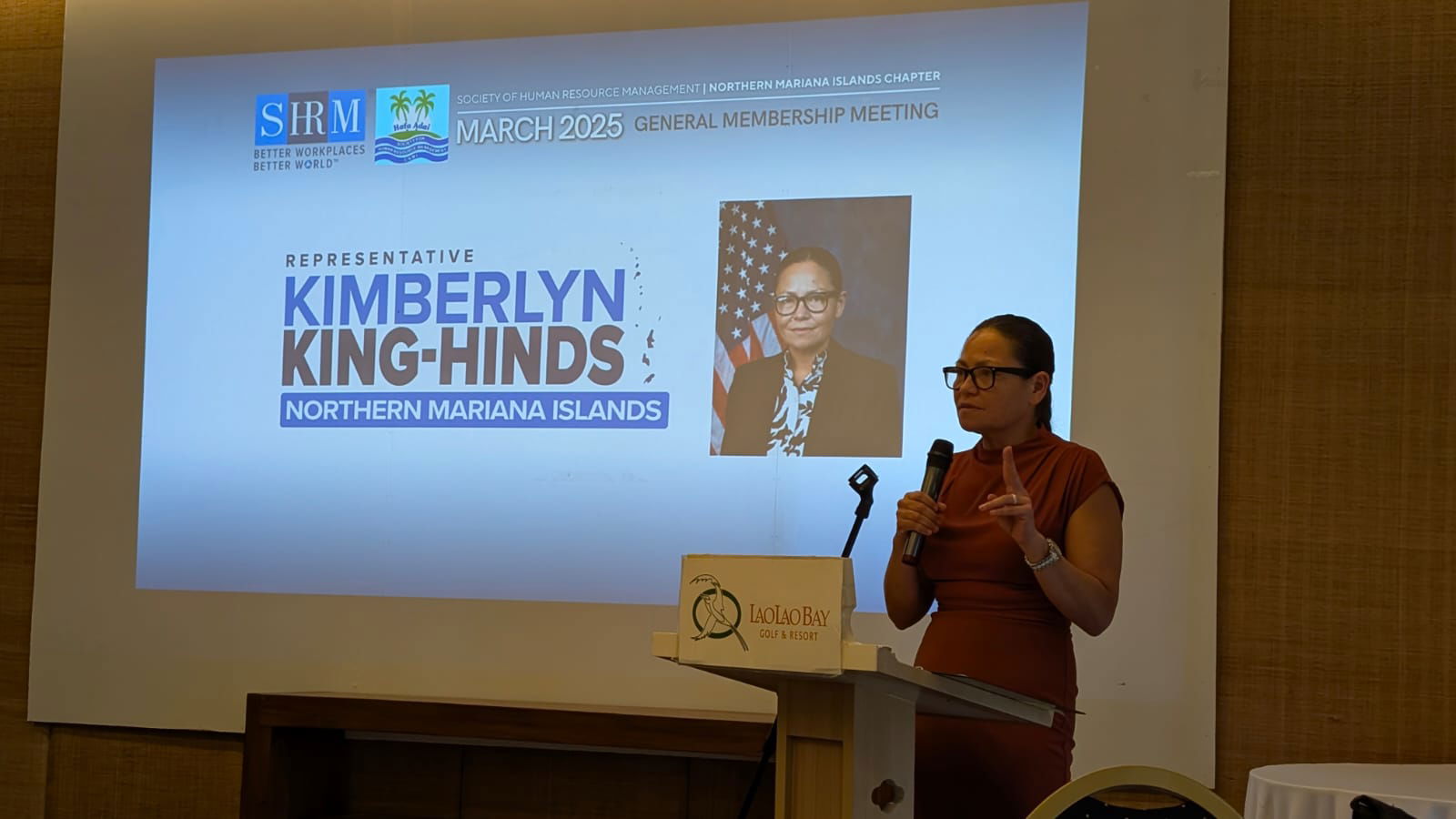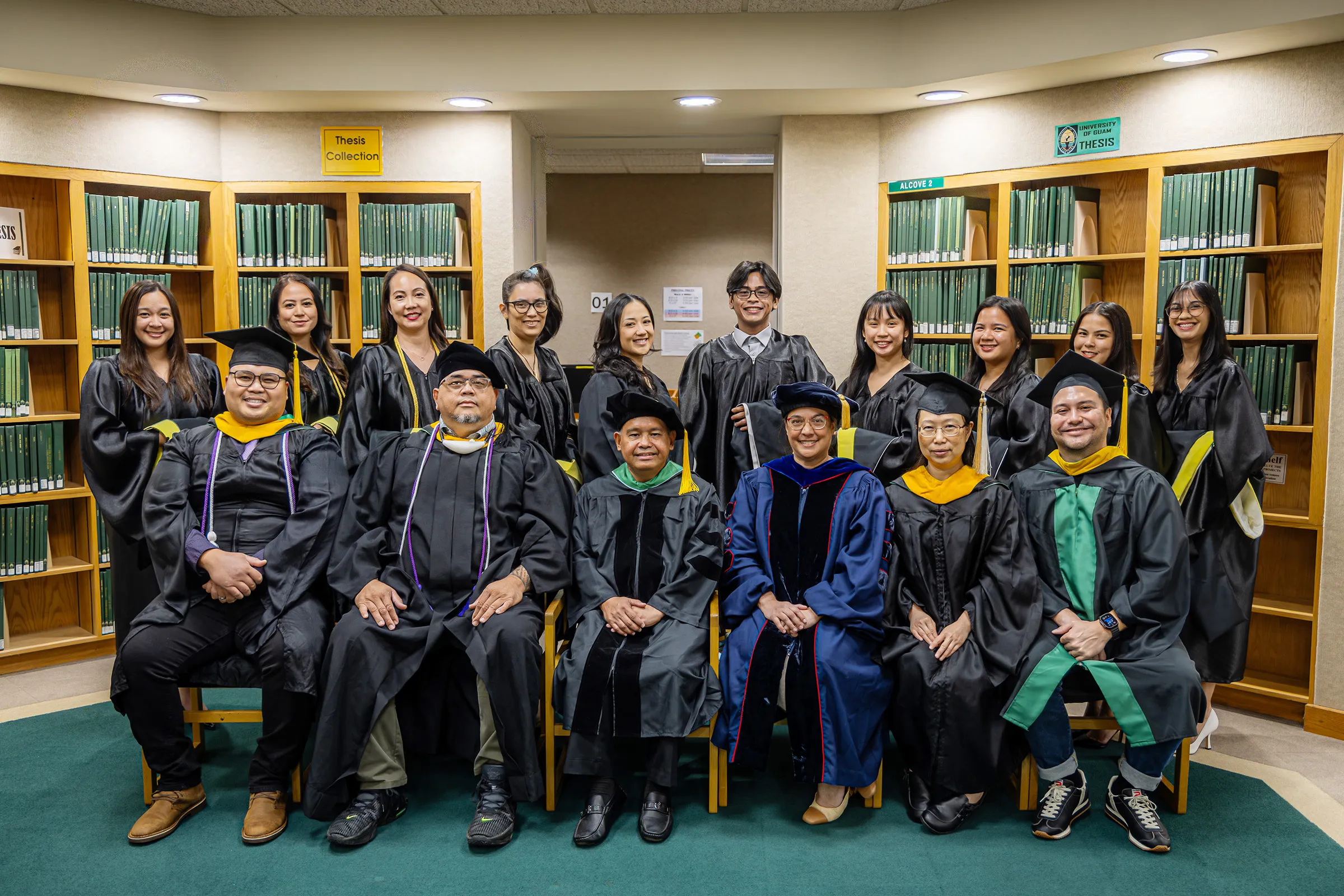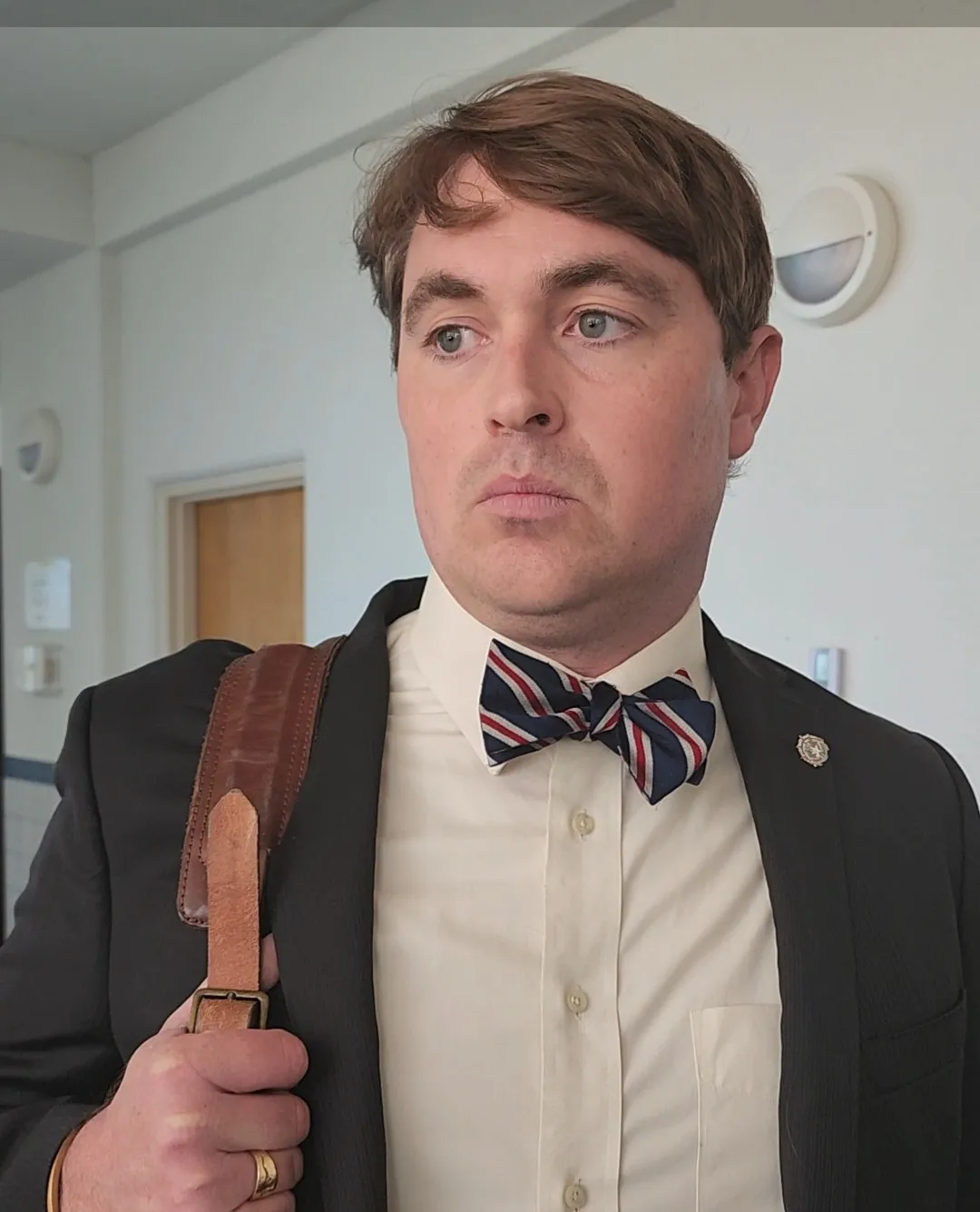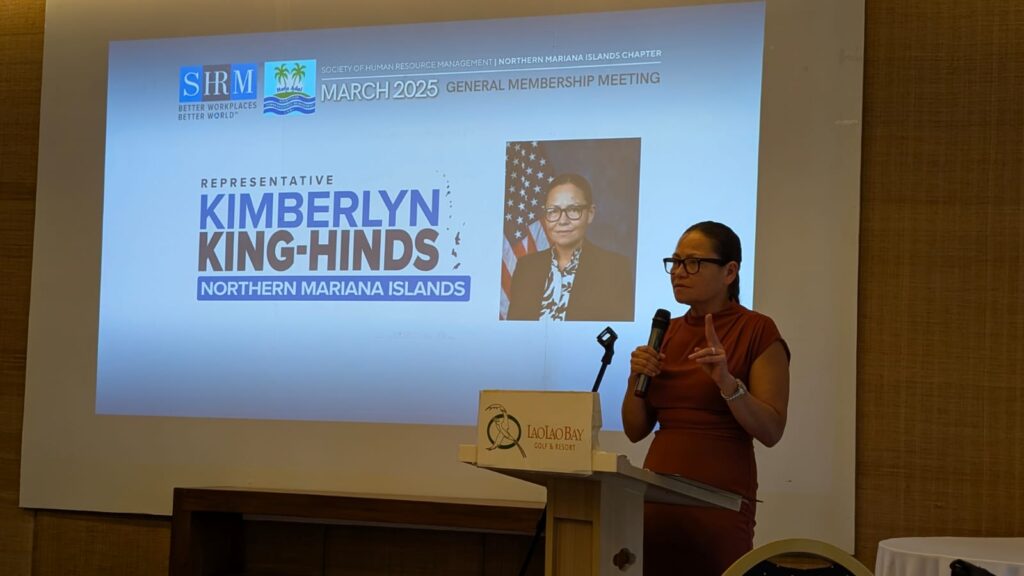
U.S. Congresswoman Kimberlyn King-Hinds delivers her remarks during a general membership meeting of the Society for Human Resource Management-CNMI Chapter at LaoLao Bay Golf & Resort’s Caladium on Tuesday.
“WE cannot train our way out of an economic depression.”
U.S. Congresswoman Kimberlyn King-Hinds shared this “one simple fact” with the officers and members of the Society for Human Resource Management-CNMI Chapter during their general membership meeting at LaoLao Bay Golf & Resort’s Caladium on Tuesday.
The HR group invited King-Hinds to discuss workforce and other related issues.
King-Hinds said the CNMI workforce needs skills and jobs. However, she added, “you can train people all day long, but if there’s no job at the end of that training, then what are we doing?”
She recognized the CNMI’s efforts in workforce development and acknowledged that “a lot of that is because of the people in this room,” referring to the HR managers. She also acknowledged the CNMI Department of Labor’s hard work in training local workers and helping them build real careers.
She said over the years, the CNMI government expanded workforce development programs through the Public School System, Northern Marianas College, and the Northern Marianas Technical Institute, and invested in local workers.
“We’ve taken the responsibility — and the financial benefits —of giving our own people a fair shot. And we’ve seen progress,” she said.
However, she added, “we cannot train our way out of an economic depression. And I don’t understand why some people don’t get this.”
She said the CNMI benefits when its residents have jobs, and residents can have jobs when businesses can afford to hire. Businesses, for their part, can afford to hire when customers walk through their doors, she said.
But right now, “we have no customers. That’s the reality.”
“How many times have you had to sit down with an employee and say, ‘I’m sorry, we have to let you go’ or ‘We’re cutting your hours’ or ‘We can’t renew your contract.’ That’s what’s happening across the entire economy right now,” King-Hinds said.
“And the truth is — it’s going to get worse. The federal money that’s been keeping things afloat? Gone. The big federal contracts that helped businesses? Mostly awarded,” she added.
And tourism, which is the CNMI’s only remaining industry now, “is less than half of where we need it to be five years after the Covid-19 pandemic. The CNMI is not in a position to just wait and see what happens, she said.
“When you see me making a fuss about air service or tourism access, that is why — because tourism recovery doesn’t happen by accident — it takes real action. That means securing direct flights, pushing for expanded visa-free travel, and ensuring that federal policies help, not block, our efforts to rebuild,” King-Hinds said.
She said those who lost their jobs when the Hyatt Regency Saipan shut down, and those who will be jobless once DFS closes shop on April 30, “are real people.”
She said she has spoken to some individuals who have lost their jobs and have decided to move to the States. “These are the local workers who wanted to work in tourism, but tourism is not happening here anymore,” she added.
King-Hinds said by 2022, the employment in tourism sector dropped by 50%. “That’s 2,391 fewer people working in the CNMI’s main industry,” she said.
“And let’s be clear — the cause wasn’t Yutu and it wasn’t Covid. Those were events. What’s happening now is the impact of our actions. Our community has shrunk more than nearly anywhere else in the nation. We no longer have customers to support our employees,” King-Hinds said.
“We can all agree having more industries is necessary, but we have an industry that exists and is struggling [and] cannot be ignored,” she added.
She said the CNMI needs customers today. She added that there is also a need to further “train and upskill our workers.”
She said with H.R. 1797, a bill she recently introduced, “we will hopefully correct a [longtime] injustice with the Wagner-Peyser Act, bringing one of the federal government’s largest employment services programs to our islands. This puts our workers at the frontline of our economy.”
King-Hinds reiterated that training alone won’t solve the islands’ economic problems because the CNMI also needs to make sure businesses have a reason to hire workers. “That means, bringing the customers back. Because no customers means no revenue, no jobs, and no economy,” she said.
Her goal is to make sure “our workforce actually has work waiting for them.”
She said, “We can’t keep giving fuel to folks outside the CNMI who are calling for the end of our exemptions in federal law. Now I want you to look at what people outside the CNMI are saying about us. We’ve seen think tanks and talking heads in Washington — people who don’t live here — push for restrictions on our economy. And they’re using our own words to do it. Our own words.”
King-Hinds said: “The words we use have consequences. When we give fuel to the fire of restricting tourism, we are also putting our workforce and economy at risk.”
She said the CNMI’s “access to tourists and our access to foreign workers come from the same place. When we give fuel to those calling for an end to the exemptions that keep our customers coming, that includes the exemptions that allow us to have the workers we need.”
“And thanks to the misconceptions some people have helped to push, the fight to fix the CW program — the fight that we all know must happen — has just gotten harder. But it’s a fight we must have,” King-Hinds said.
Unless renewed by the U.S. Congress, the CW program is set to end on Dec. 31, 2029. The program allows eligible CNMI employers to hire nonimmigrant workers who are otherwise ineligible for other nonimmigrant worker categories.
King-Hinds said she believes that by 2029, “we can pull out of this collapse. But by then, who will be left to rebuild? People are leaving, and by 2029, the immigration transition program will expire.”
“We’ve fought for extensions before, but last time it took over five years to secure. We don’t have five years this time — and the conversation with Congress should have started months ago, but it hasn’t. So let’s start it today,” she said.
She also reiterated the need for an immigration program that recognizes that the CNMI labor needs do not fit into a national system, and that these islands have unique economic conditions that no other U.S. jurisdiction faces.
She said there is a need to provide the CNMI with the flexibility to match labor availability with its economic conditions — and “not arbitrary annual quotas.”
The CNMI labor market should be stabilized “instead of forcing a transition to an immigration system that is already broken,” she added.
King-Hinds said she will reach out to the community to engage in these discussions “because we need a unified voice today on the future for the labor market we need. We need a unified strategy to get Washington to act.”
“That means working with every sector — business owners, workers, local leaders — to make it clear to … Congress that letting this program expire would be economic suicide,” she said.
“And this discussion is not just about what happens in 2029 — because the impacts are already here. In the three months I’ve been in office, one of the largest casework requests we’ve received has been on delayed immigration applications — some still waiting six months for a response.
“These are visa applications where fees have already been paid, where businesses have already demonstrated no U.S. worker is available. Yet — silence.
“This is happening across federal programs — Social Security, Veterans Affairs, Medicare, Internal Revenue Service — and that’s why my office is here to help.”
King-Hinds said, “In this environment, even the smallest level of economic activity matters —keeping a restaurant open, manning a storefront, maintaining a facility, receiving a federal benefit check —it’s all critical.”
She said she appreciates “what the President is doing. We need a federal government not lost in bureaucracy but one that is doing a service. That’s why I’m here with an open invitation.”
She urged HR managers to reach out to her office if they have a problem with delayed immigration applications, federal benefits, or accessing services.
“I am proud of the staff we have at the district office. They are committed to service and can and will do what they can to make sure you have access to the federal government right here at home when you need it. I trust them and you can, too. Please, let us know how we can help,” she said.










